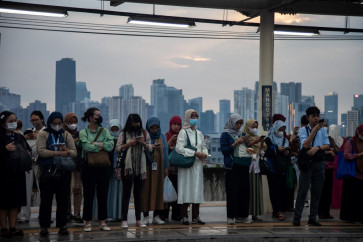Popular Reads
Top Results
Can't find what you're looking for?
View all search resultsPopular Reads
Top Results
Can't find what you're looking for?
View all search resultsIndonesian family planning: A journalistic view
Against the backdrop of a stagnant population control program over the last decade, Indonesia is hosting the fourth International Conference on Family Planning (ICFP) in Nusa Dua, Bali from Jan
Change text size
Gift Premium Articles
to Anyone
A
gainst the backdrop of a stagnant population control program over the last decade, Indonesia is hosting the fourth International Conference on Family Planning (ICFP) in Nusa Dua, Bali from Jan. 25 through to Jan. 28. But what does the biennial event, dubbed the largest international meeting focusing on family planning, mean for Indonesia's bid to harvest its demographic dividend?
Jointly hosted by the National Population and Family Planning Agency (BKKBN) and the Bill & Melinda Gates Institute for Population and Reproductive Health at the Johns Hopkins Bloomberg School of Public Health, the conference gathers 3,000 policymakers, academics, donors, representatives of civil society groups, media members and other participants from 80 countries.
For Surya Chandra Surapaty, the newly elected chairperson of the BKKBN, the forum provides new momentum to efforts to revitalize the national family planning program. Indonesia can share both the progress and setbacks of its family planning, and thus help the world address its population challenges.
Many experts are skeptical that the national family planning program has run effectively under decentralization. The obvious result of the transfer of authority from the central to regional governments is Indonesia's total fertility rate (TFR) being consistently at 2.6. But, based on Performance Monitoring and Accountability (PMA) 2020, part of the Family Planning 2020 initiative, the rate has already reached the worrying level of 2.3 in 2015. With such a high fertility rate, by 2030, Indonesia's population is set to increase by 19 percent to 293.5 million, which the country can hardly afford.
At present, Indonesia's population growth is estimated at 1.38 percent. The mid- and long-term development plan (RPJMN) 2015-2019 aims for growth of 1.2 percent by 2019.
Prior to ICFP, BKKBN with support from the Johns Hopkins Bloomberg School of Public Health's Center for Communication Program commissioned Kompas senior journalist Maria Hartiningsih and myself to travel to some provinces to learn how family planning program worked and affected local people. The months-long trip resulted in a bilingual journalistic report entitled, A New Era for Family Planning in Indonesia.
Our visit to the provinces and regencies found that decentralization as really taken its toll on family planning and health programs, with a decreasing quality of public services. Some local leaders are reluctant to implement the program and some of them do not even understand what a family planning program is and how it links with their regional and human resources development plans.
But we can still see a ray of hope. Several provinces such as South Sulawesi, Maluku, West, Central and East Java run excellent family planning and public health programs and many regions incorporate family planning into their family and women's economic empowerment, public health, youth and even rural infrastructure expansion programs.
With such thriving programs, decentralization should not be considered a hindrance to family planning. Instead it can be a springboard for creativity and innovation as it removes the centralistic and top-down approaches that were behind the success of family planning during Soeharto's New Order era.
Having a one-size-fits-all family planning policy over all of Indonesia's 17,000 islands is impossible. Every region has its own unique conditions and only its leader knows what his or her people need. The success of family planning in the decentralization era therefore lies in the hands of visionary leaders at central, provincial and district levels.
While in many regions decentralization has created confusion of authority related to family planning, the program remains robust at the grassroots level, with more women and men joining voluntarily. We have found faith-based organizations, civil society groups, dedicated field officers, courageous midwives and health providers who have kept the program alive and kicking.
The country's two largest Muslim organizations ' Nahdlatul Ulama (NU) and Muhammadiyah ' have been playing an incredible role in implementing family planning to fill the void.
'We include family planning in our dakwah (proselatization) and recitations of the Koran during village activities,' explains Hj. Farida Salahudin Wahid, 71, chairperson of Yayasan Kesejahteraan Muslimat Nahdlatul Ulama, the NU charity foundation that provides thousands of hospitals, clinics and other health facilities.
NU women's wings Muslimat and Fatayat, with their highly structured and powerful leaderships at the national, provincial, regional levels and strong footing in 14,000 villages, clearly champion social change in fostering reproductive health and family planning in Indonesia.
Muhammadiyah, meanwhile, perceives family planning as an effort to advance health and wellbeing. The organization's official stance toward family planning has been advanced through its women's wing Aisyiyah since 1971 and is included in the Keluarga Aisyiyah Sejahtera (Aisyiyah Family Welfare Program).
Aisyiyah has 20 million members and operates 4,560 educational institutions, 280 health facilities and 503 economic and cooperative units across the country.
Our trip allowed us to meet with the legion of civil society groups in every corner of Indonesia that give people in remote areas and underprivileged groups equal access to family planning services, reproductive, as well as general, healthcare.
Most of all, the roles of midwives, field officers (PLKB) and volunteers should be put on a high pedestal as the front liners in family planning efforts.
In Indonesia, 250,000 midwives play a pivotal role in helping deliver 63 percent of the 4.6 million births every year. Despite their limited salaries and facilities, these midwives are also responsible for 76.6 percent of family planning services for millions of women in all parts of Indonesia.
The other dedicated front liners are PLKB and volunteers. One PLKB must serve 10 to 20 villages, and while PLKB officers are on the government's payroll, village volunteers only receive a monthly retainer of Rp 7,500 (55 US cents). Many of them work wholeheartedly and often brave natural and cultural barriers, which pose a risk to their lives.
'They are the real social agents in their communities that have kept family planning alive,' said Hari Fitri Putjuk, country director of Johns Hopkins Bloomberg School of Public Health Center for Communication Program Indonesia, who accompanied us on our trips.
What is encouraging is that BKKBN, once a rigid government institution and the sole provider of family planning services, open-heartedly accepts our findings. 'These findings, good and bad, will form a basis for us to work together to improve the program as we move ahead,' Surapaty said after reading our report.
Time has changed. Gone is the top-down family planning policy. He says a drastic mental revolution in Indonesian family planning is badly needed.
He is referring to mental revolution as a change from the 'feudal and bureaucratic' mentality of civil servants, academics and policymakers, including those working with BKKBN.
He promises to lead BKKBN in a new direction. One of his primary goals is changing BKKBN from an inactive and bulky organization into one that is action-oriented and efficient, by embracing local governments, civil society and all of the public to make the family planning program a success ' a promise that might not be easy to keep.
_________________________________
The writer is a staff writer at The Jakarta Post and co-author of The New Era for Family Planning in Indonesia.










